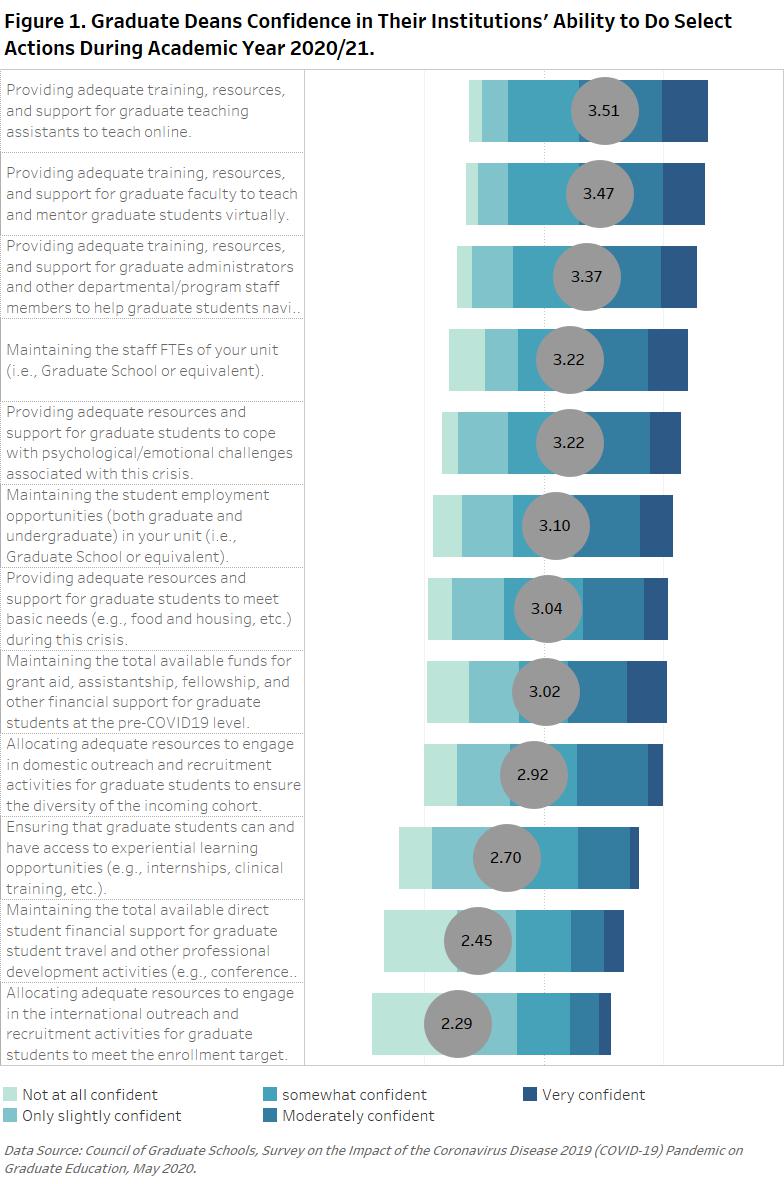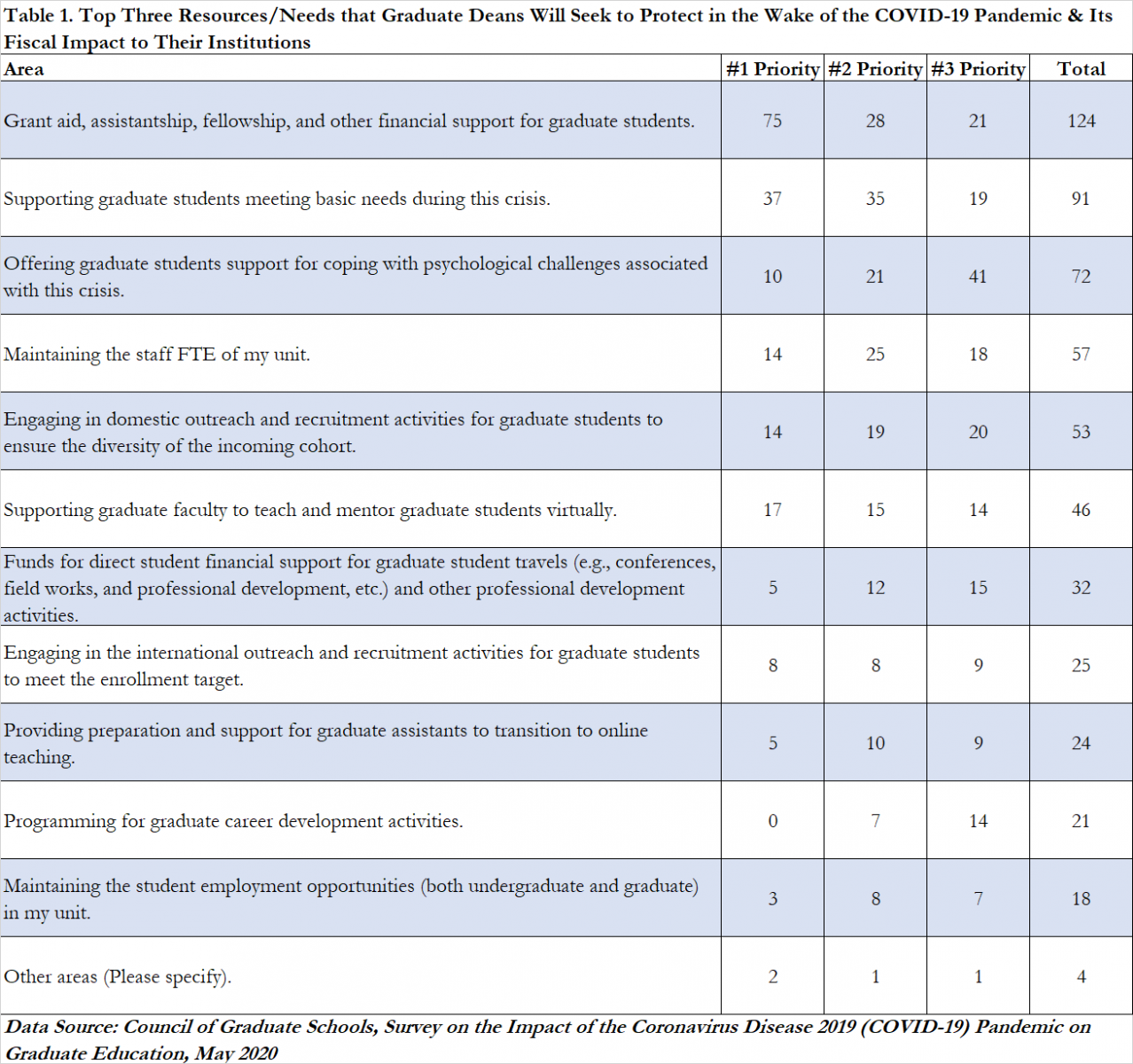You are on CGS' Legacy Site.
Thank you for visiting CGS! You are currently using CGS' legacy site, which is no longer supported. For up-to-date information, including publications purchasing and meeting information, please visit cgsnet.org.
General Content
While colleges sort through those challenges, education groups are making the case to federal officials that Optional Practical Training is an essential tool for bringing international students to U.S. campuses.
“This should not be an us versus them type of conversation,” said Lauren Inouye, vice president for public policy and government affairs at the Council of Graduate Schools.
Elite schools actually saw an increase last year in international graduate students, according to the Council of Graduate Schools.
On June 2, Congressman Steve Stivers (R-OH) led a Dear Colleague letter signed by 20 of his House Republican colleagues to Secretary of State Mike Pompeo and Acting Secretary of Department of Homeland Security Chad Wolf demonstrating the powerful contributions of international students to the U.S. and urging preservation of Optional Practical Training (OPT).
STATEMENT FROM THE CGS PRESIDENT AND BOARD OF DIRECTORS
Dear Colleagues,
Recent days and weeks have brought us heart-wrenching reminders of race-based inequality and injustice. In addition to COVID-19’s disproportionate impact on students of color and their families, we have witnessed appalling acts of racism and violence toward African Americans—most recently George Floyd, Breonna Taylor, Ahmaud Arbery, and Tony McDade—acts that cause further distress and fear among communities already suffering.
The CGS Board of Directors condemns both the deeply embedded and structural forms of racism and injustice we see around us as well as their most immediate manifestations. We also stand in solidarity with people of color in our community as they confront painful examples of violence and injustice.
We also acknowledge that words are not enough. As an organization, we affirm our commitment to fostering diversity and inclusion at all levels of graduate education. We will continue working with our members to make programs more diverse and accessible, to promote diversity as a principle that supports the learning of all students, to deepen our understanding of inclusive mentoring practices, and to provide inclusive and accessible student support services.
Of equal importance, we commit to helping our students develop the conceptual frameworks and analytic methods necessary to understand social and economic forms of injustice, in all their manifestations. We also commit to helping them develop the leadership skills necessary to begin building a better, more just society. To paraphrase Mahatma Gandhi, we must create graduate programs and institutional cultures that prepare students to be the change this world so desperately needs.
If you have suggestions for how CGS can better support this work, please contact president@cgs.nche.edu.
In solidarity with you, your staff, and your students,
Suzanne T. Ortega
President
Council of Graduate Schools
Sally Pratt
Chair, CGS Board of Directors (2020)
Vice Provost for Graduate Programs University of Southern California
on behalf of the CGS Board of Directors
February 12, 2020
The Council of Graduate Schools (CGS) has published new data showing that international graduate application and first-time enrollment rates have increased at U.S. universities for the first time since Fall 2016. For Fall 2019, the final application counts from prospective international students increased by 3%, and the first-time enrollment of international graduate students increased by 4%. The proportion of first-time international graduate enrollment in master’s and certificate programs (75%) vs. doctoral programs (25%) has remained roughly the same.
JUNE 3, 2020 | CGS Research-in-Brief
The Council of Graduate Schools (CGS) fielded the Survey on the Impact of the Coronavirus Disease 2019 (COVID-19) Pandemic on Graduate Education to its member institutions. The survey was electronically disseminated to 456 CGS Regular Member institutions based in the United States and Canada between May 4 and 11, 2020. A total of 201 responses, or the response rate of 44%, was recorded. Public institutions, as well as Doctoral Universities-Very High Research Activity (R1) institutions, were overrepresented among the respondents. The below brief summarizes the aggregated, unweighted findings from the survey. The full frequency tables, including the questionnaire items and descriptive characteristics of responding institutions, can be found in the appendix.
Immediate Plans & Decisions Made to Date
- Roughly three out of four graduate deans (76%) noted that their institutions had formed a campus task force or committee of stakeholders addressing the ongoing impact of the COVID-19 pandemic on graduate education.
- Of the respondents, 64% of graduate deans reported that their institutions had adopted holistic approaches to graduate admissions before the pandemic or have since instructed individual graduate programs to adopt holistic approaches in future graduate admissions decisions. A little over one out of five (22%) reported that their institutions have not decided on how the pass/fail or similar grade schemes for Spring 2020 will be factored into the graduate admission processes, however.
Check out the CGS statement on graduate admissions during the COVID-19 pandemic.
- The majority of graduate deans reported that they do not anticipate changes to current policies (18%) or are granting extensions on a case-by-case basis (47%). Fewer institutions (14%) indicated that their institutions have either granted an automatic extension or are granting extensions on a case-by-case basis.
- The pandemic has also affected some of the key summer activities for graduate schools. Of the graduate deans who responded and were aware of such decisions, 87% reported that dissertation camps or other place-based writing retreats for graduate students this summer had been modified to an alternative format. 21% noted that summer bridge and other placed-based outreach programs for URM and master’s students had been modified. Also, nearly two-thirds (66%) reported that they had modified the delivery mode of fall orientation.
Has your institution transitioned dissertation camps or other place-based writing retreats for graduate students to a virtual format? Share with you colleagues how you have done it!
Check out the CGS webinar, Moving to a Virtual Space: How to Create Virtual Graduate Student Orientations.
How are you planning for virtual new student orientations? What will you be doing over the summer to stay in touch with incoming graduate students? Share with your colleagues what you are planning!
- Many graduate deans (87%) reported that their institutions have or anticipate budget shortfalls due to the COVID-19 pandemic. However, the vast majority of them also noted that their institutions are committed to honoring all accepted financial support offers made to incoming graduate students (67%) and all financial support for commitments made to current/returning students (74%). Although relatively few, there are some institutions that have rescinded or given individual program discretions to rescind graduate student financial support to meet the budgetary shortfalls for both incoming (5%) and current/returning students (7%).
- At the time of the survey, a number of graduate deans reported that either their institutions had not distributed any direct student aid through the CARES Act or do not know if aid was made available to graduate students.
Keep yourself apprised of federal policy updates related to the COVID-19 pandemic, as well as sign up to receive our weekly Washington Insights & Highlights.
Outlook for AY2020/21 and Priorities
- Graduate deans responding to the survey reported a range of anticipated enrollment levels for Fall 2020. Still, they expect a modest decline in the overall enrollment, as well as in enrollment of domestic, underrepresented minorities. Graduate deans reported a more pessimistic outlook for international graduate enrollment in Fall 2020.
- Looking toward Academic Year 2020/2021, graduate deans responding to the survey are more optimistic about their institution’s ability to provide training, support, or resources for stakeholders of graduate education to navigate the crisis. For example, graduate deans are somewhat/moderately confident about providing adequate training for graduate teaching assistant teaching online (Average=3.51 out of 5), graduate faculty teaching and mentoring graduate students virtually (Average=3.47/5), and supporting administrators and departmental staff members to help graduate students (Average=3.37/5).

- However, graduate deans in the survey were less confident about their institution’s ability to allocate adequate resources to engage in international outreach or recruitment activities (Average=2.29/5) or maintain the level of available financial support for graduate student travel and other professional development activities (Average=2.45/5). They were also less confident that their institutions can ensure graduate students having access to experiential learning opportunities, such as internships and clinical training (Average=2.70/5).
Be sure to register for the upcoming virtual Summer Workshop, learn from experts and your peers about how to navigate some of the challenges, such as supporting international graduate students, offering career development opportunities and experiential learning opportunities for graduate students during the pandemic.
- Finally, graduate deans in the survey identified protecting funds for grant aid, assistantships, fellowships, and other financial support for graduate students as the top priority in the wake of the pandemic and its impact on the institution’s budget. This was followed by protecting resources for supporting graduate students' basic needs during the crisis and offering graduate students support for coping with psychological challenges associated with this crisis.

- Although graduate deans were not as confident in their institution’s ability to do so, few of them identified engaging international outreach and recruitment activities or maintaining funds for graduate student travels and other professional development activities as a high priority area for protecting resources.
CGS also offers various platforms for member institutions to learn from each other as we navigate the pandemic together, and we encourage you to bookmark our COVID-19 resource page as a one-stop shop. The page features various U.S. government guidance, as well as resources page put together by some of the CGS member institutions. You can also directly engage other CGS members via the Dean’s Discussion Board, where you can ask questions to your peers and also to weigh in on questions from others.
Author Contribution and Acknowledgment
The brief was prepared by Hironao Okahana. CGS President Suzanne T. Ortega, the Leadership Team, Research Team, and Research and Information Services Committee provided feedback to the data collection instrument, as well as on the write-up. Enyu Zhou and Janet Gao contributed to the preparation of the annotated questionnaire document.
###
CGS Supports the Endless Frontier Act
On June 1, CGS sent letters to House and Senate lawmakers endorsing the Endless Frontier Act (H.R. 6978/S. 3832). Introduced by Representatives Ro Khanna (D-CA) and Mike Gallagher (R-WI) and Senators Chuck Schumer (D-NY) and Todd Young (R-IN), the legislation provides significant investments in the National Science Foundation with an expanded focus on new technology. Funding for additional fellowships and traineeships would support undergraduate and graduate students.
“Hispanic Serving Institutions: A Critical Pipeline to Graduate School for Latinx Students” is an information brief and interactive toolkit designed to help close the gap in graduate degree attainment for Latinx students. The project was led by JoAnn Canales, CGS’s Dean-In-Residence from 2018 through 2019. Dr. Canales’ work underscores how the graduate enrollment and degree attainment of Latinx students continues to lag behind those of other groups. The project identified Hispanic Serving Institutions (HSI) - defined as accredited, degree-granting public or private non-profit institutions of higher education with at least 25% full-time equivalent undergraduate students who identify as Hispanic - as a possible vanguard to lead the higher education community as they address this disparity.
The brief is accompanied by a set of checklists looking at how Latinx students can be more successfully recruited, retained, and supported during various phases of the graduate student lifecycle. These checklists are not only designed as a complimentary framework to the brief, but also to provide administrators with a tool to help assess and implement the resources needed to improve Latinx student outcomes.
Additional CGS Resources
Doctoral Initiative on Minority Attrition and Completion
Innovation in Graduate Admissions Through Holistic Review
The Global Postgraduate Diversity Resource - A CGS-ETS Joint Initiative
Graduate Enrollment and Degrees, 2008-2018
Contact




